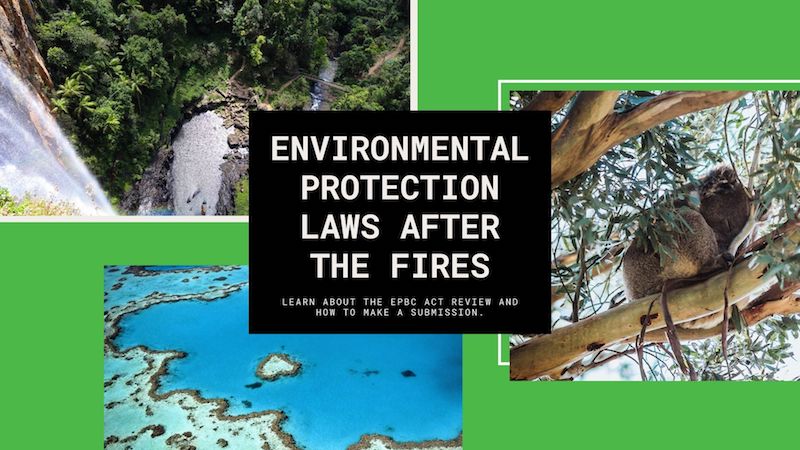
Attending tonight? Didn’t receive the Zoom link? Text/call Elissa 0418 786 986 or email elissa.jenkins@greeninstitute.org.au
Environmental Protection Laws After The Fires: Learn About The EPBC Act Review And How To Make A Submission.
This summer has changed everything. We are now living in the age of climate consequences, and, for so many people, old ideas of the world have burned away. For the first time, bushfires in Australia are being seen not as a “natural disaster” impacting on humans, but as a human-caused catastrophe with disastrous consequences for wildlife and the natural world – consequences which will inevitably rebound on us.
In this context, the Morrison Government is reviewing the Commonwealth Environment Protection and Biodiversity Conservation Act. The Act has been a debacle for environmental protection in Australia, enabling destructive developments on a grand scale. And yet, the government has framed the review as an opportunity to make these developments even easier and faster to get approvals for.
Submissions to the review are currently open. This is a chance to help set the agenda for the review panel, ensuring that they hear from large numbers of Australians calling on them to use this moment to change direction and design new environment laws which recognise that we humans are part of the natural world and that our health and survival are fundamentally intertwined with the health of ecosystems. After a summer which has caused untold destruction to ecologies, we must introduce Earth-centred laws which prioritise the protection and rehabilitation of the natural world at their heart.
For this webinar, Green Institute Executive Director, Tim Hollo, will be joined by Dr Michelle Maloney, National Convenor of the Australian Earth Laws Alliance, and Revel Pointon, Senior Solicitor at the Environmental Defenders Office’s Queensland Office.
Tim, Michelle and Revel will take you through the context and the process, put forward some ideas for deep change, and answer questions on how best to frame and write submissions, which are open until April 17.
Dr Michelle Maloney: Michelle has a Bachelor of Arts and Law (Hons) from the Australian National University and a PhD in Law from Griffith University, Australia. She has more than 25 years’ experience creating and managing social justice, community development and ecological justice programs, including ten years working with First Nations Peoples in Queensland, on social justice and cultural heritage projects. As Co-Founder and National Convenor of the Australian Earth Laws Alliance (AELA), Michelle manages the strategic direction and governance of AELA, including the extensive partnerships and networks that AELA has with the legal, academic, indigenous and environmental advocacy communities. Michelle also designs and manages AELA programs and events, including AELA’s Rights of Nature Tribunals.
Michelle has written a dozen articles and edited two books about Earth jurisprudence and wild law— “Wild Law in Practice” (2014) and “Law as if Earth Really Mattered: The Wild Law Judgments Project” (2017), both with Routledge. She teaches an annual Earth Laws subject at Griffith University Law School.
Michelle is the Australian representative on the Executive Committee of the Global Alliance for the Rights of Nature, a member of the Steering Group of ELGA, the Ecological Law and Governance Association and is co-founder and Steering Group member of the New Economy Network Australia (NENA).
Revel Pointon: Revel is a senior solicitor leading work on law reform, education and advice with EDO’s Queensland office. She focuses on ensuring that our environmental laws and policies adequately protect our environment, provide for accountable and transparent governance and provide meaningful community participation in decisions that affect our environment and communities. Revel is on a number of government and non-government advisory committees and advises government and peak environment groups on Queensland and federal environmental law and policy matters. She also provides community education workshops and materials on law reform matters to help empower the community to engage in law and policy that affects the environments of concern to them, and their health, as well as general legal advice.
Revel commenced work with EDO Qld in 2011 and returned in 2014 after taking a year off to complete a masters degree overseas. Prior to working at EDO, Revel worked at Minter Ellison in their planning and environment team, as well as working as a sustainability educator in Mexico. Revel tutors and guest lectures in various subjects, including in planning law, mining and resource law and environment law courses at Griffith University, Queensland University of Technology and University of Queensland.
Revel has a Bachelor of Laws and Bachelor of Environmental Management from the University of Queensland, a Masters in Culture and Development Studies from KU Leuven, Belgium and a Graduate Certificate in Policy and Governance from Queensland University of Technology. Revel was recipient of the 2017-2018 Mahla Pearlman Australian Young Environmental Lawyer of the Year award.
Tim Hollo: Tim is Executive Director of the Green Institute. A former Director of Communications for Christine Milne, he has also worked in campaign, communications, policy and governance capacities for Greenpeace, 350.org, the Nature Conservation Council of NSW and others for over 15 years.
As a musician, he has performed around the world, from the Sydney Opera House to Carnegie Hall and, in 2013, he founded Green Music Australia. His writing has been published in The Guardian, ABC Online, Crikey, The Huffington Post and elsewhere.